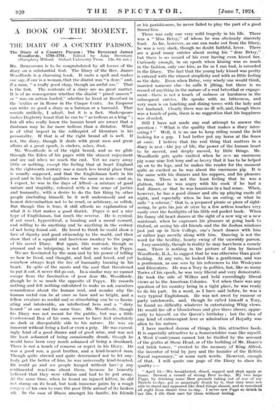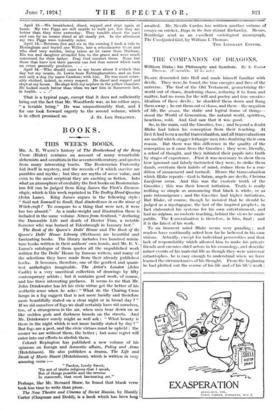A BOOK OF THE MOMENT.
THE DIARY OF A COUNTRY PARSON.
The Diary of a Country Parson : The Reverend James Woodforde, 1758-1781. Edited by John Beresford. (Humphrey Milford. Oxford University Press. 12s. 6d. net.) Ma. BP,RESFORD is to be congratulated by all lovers of the diary on a substantial find. The Diary of the Rev. James Woodforde is a charming book. It casts a spell and 'makes one say, if one is a woman, that the diarist was "a dear," and, if a man, " a really good chap, though an awful ass." That is the test. The contents of a diary are no great matter. It is of no consequence whether the diarist " pined unseen or " was on action hurled," whether he lived at Romford in the 'sixties or in Rome in the Cinque Cento. An Emperor can write as good a diary as a batman or a barmaid. That sounds unlikely, I admit, but it is a fact. Shakespeare makes Dogherry boast that he can be " as tedious as a king " ; but all who really know the human heart are aware that a dustman may be far more tedious than a dictator. What is of vital import in the soliloquist of literature is his personality. If that is of the right brand all is well. If not, the diary, though it deals with great men and great affairs at a great epoch, is cinders, ashes, dust.
Mr. Woodforde is of the right brand, and so we glide through. the Eden of his pages with the utmost enjoyment and are sad when we reach the end. Yet we carry away little or nothing, except the feeling that at heart England in the eighteenth century was a much less brutal place than is usually supposed, and that the Englishman both in his good and in his bad qualities was the same as now—and as, I expect, he was in the days of Alfred—a mixture of good nature and stupidity, coloured with a fine sense of justice and humanity, with a desire to do the fair thing by other people (including himself, be it well understood) and an honest determination not to be cruel, or arbitrary, or selfish. But though this is true, it still affords no explanation of what it is that makes a good diarist. Pepys is not a nice type of Englishman, but much the reverse. He is cynical, if not cruel, hypocritical, a humbug and a moral coward, end willing to do anything and be anything in the ecstasy of not being found out. He loved to think he could show a face of dignity and good citizenship to the world, and then show that of a squalid and lascivious monkey to the pages of his secret Diary. But again, this contrast, though so piquant and so intriguing, is not what we value in Pepys.
We are fascinated by the man and by his power of telling us how he lived, and thought, and lied, and loved, and yet somehow always kept the fire of humanity burning in his heart. In spite of the smuts and the soot that threatened to put it out, it never did go out. In a similar way we cannot escape from the fascination of poor dear Mr. Woodforde, though he is so much the opposite of Pepys. He records nothing and felt nothing calculated to make us ask ourselves conundrums about the human soul, and wonder why the human metal can be at once so base and so bright, and a fellow creature so, sordid and so stimulating can be so fascin- ating and intolerable, an intellectual hero and a " dirty hound " at one and the same time. Mr. Woodforde, though his Diary was not meant for the public, but was a little Confessional Box of his own, seems to have had absolutely no dark or disreputable side to his nature. He was an innocent without being a fool or even a prig. He was exceed- ingly fond of a good dinner and of good wine, and was not the least ashamed of being occasionally drunk, though he would have been very much ashamed of being a drunkard. There is not a touch of remorse or regret in his Diary. He was a good son, a good brother, and a kind-hearted man. Though quite shrewd and quite determined not to let any- body get the better of him, he was universally kind-hearted. He could go and see people hanged without having any sentimental reactions about them, because he honestly believed that they were Villains and had to be put away. At the same time, when he found an injured kitten, he did not stamp on its head, but took immense pains by a rough surgery of his own to cure the poor little animal of its broken
rib. In the case of:illness amongst , his family. his friends . . or his parishioners, he never failed to play the part of a good Samaritan.
There was only one very mild tragedy in his life. There was a " Miss Betsy," of whom he was obviously sincerely fond. As far, however, as one can make out from the Diary, he was a very slack, though 'no doubt faithful, lover. There are a good many entries about seeing his " dear Betsy," but there is no record of his ever having even kissed her. - Curiously enough, in an epoch when kisSing was so much in the fashion, only one kiss, as far as I can find, is recorded in the Diary. The fact that the young lady kissed was pretty is entered with the utmost simplicity and with as little feeling as the date. Even when Betsy, very wisely one would. think, married someone elsehe calls it jilting, but there is no record of anything in the nature of a real betrothal or engage- ment—there is not a touch of sadness or harshness in the subsequent entries. He speaks with no bitterness, and very soon is on lunching and dining terms with the lady and her husband. Clearly there was no ill will, and, though there , was a touch of pain, there is no suggestion that his happiness was clouded.
Still I have not made any real attempt to answer the
question : " What is the quality that -makes a diary inter- esting ? " WeII, it is no use to keep riding round the field looking for a gap_ I had better put my horse at the fence at once. I believe that the real thing that matters in a
diary is zest—the joy of life, the power of the human heart to be moved, and deeply moved, by little things. Mr.
Woodforde gets quite excited when he secs an enormous pig some nine .feet long and heavy that it has to be helped up on to its legs, and he -makeS the reader for the moment quite as excited as he was about the enormous Pig. It is the same with his dinners' and his suppers, and his pleasure
in them. There is not the least feeling that he was a glutton, that he was angry with his cook' if he had a
bad .dinner, or 'that he was luxurious in a bad sense. When, however, he has a good dinner and sits up playing cards all
night, and especially when he has an outing, or what he calls " a scheme," that is, a prepared picnic or piece of sight-
seeing, he gets his joie de vivre by a few artless touches very easily over the footlights of his little red pocket book. When
his funny old heart dances at the sight of a new wig or a new waistcoat, when he expresses his pleasure at going back to Oxford, at seeing his old friends and the Sir Joshua windows just put up in New College, one's heart dances with him or rather jogs merrily along with him; Dancing is not the word for the healthy, hearty swing of the unwieldy parson.
I say unwieldy, though in reality he Disk have been- a comely man. There is nothing in the picture of him by Samuel Woodforde, R.A., to ,suggest that he was otherwise than good- looking. At. any .rate, he looked like a .gentleman, and was a gentleman, as one sees by his references to the Wesleyans and Dissenters. He was a Tory in polities, but, like so many Tories of hfs epoch, he was very liberal and very democratic. He took the side of Wilkes and held exceedingly liberal views as to the American C,olonies. Vet when there was any question of his country being in a tight place, he was ready
to do his part. In a word, as I have said before, he was a very typical Englishman. He was not awed by rumour or party catchwords, and, thOugh lie called himself a Tory,
he found no .difficulty whatever in entertaining Whig views. He would fire off a blunderbuss and give three cheers, appar- ently to himself, on the Queen's birthday; but the idea of
any kind of extravagant love or admiration of Royalty was alien to his nature.
I have marked dozens of things, in this attractive_ book.
It is especially attractive to a Somersetshire man like myself. A West Countryman cannot but be thrilled by the account
of the grotto at Stour Head, or of the building of Mr. Hoare's, red, brick tower, " erected to the memory of King Alfred,
the inventor of trial by jury and the founder of the British
Naval supremacy," or some such words. However, enough, of that. I will quote one page of the Diary to show its
quality :—
" April 15.—We breakfasted, dined; supped and slept again at home. Brewed a vessel! of strong Beer to-day. -My two large Piggs, by drinking some Beer grounds taking out of one of my Barrels to-day, got so amazingly drunk by it, that they were not able to stand and appealed like detid things almost and so remained all night from dinner time to-day. never saw Piggs so' drunk-in "my life. I slit their' ears for-them without feeling.
April 18.—We breakfasted, dined, supped and slept again at home. My two Piggs are still unable to walk yet, but they are better than they were yesterday. They tumble about the yard and can by no means stand at all steady yet. In the afternoon my two Viggs were tolerably sober.
April 18.—Between five and six in the evening I took a ride to Honingham and buried one Willen, late a schbohnaster there and who died very sudden, being taken as ho came from Durham. His son and daughter attended him to the grave and were much concerned for their father. Pray God comfort them. None but those that have lost their parents can feel that sorrow which such an event generally produces. . . .
April 24.—Who should come to my house about 2 o'clock this day but my cousin, Js. Lewis from Nottinghamshire, and on foot and only a dog (by name Careless) with him. He was most miser- ably clothed, mdeed, in every respect. Ho dined and supped and slept at my house. He slept with my nephew in the yellow chamber. He looked much better than when we saw him in Somersett last, in health. • . ."
That is a typical page, except that it does not sufficiently bring out the fact that Mr. Woodforde was, as his editor says, " a lovable being." He was unquestionably that, and I for one look forward eagerly to the second volume, which











































 Previous page
Previous page